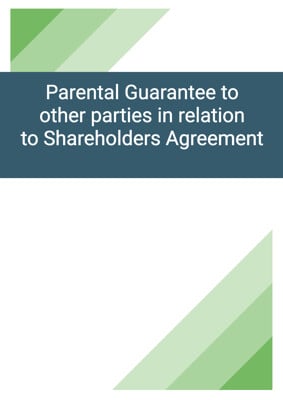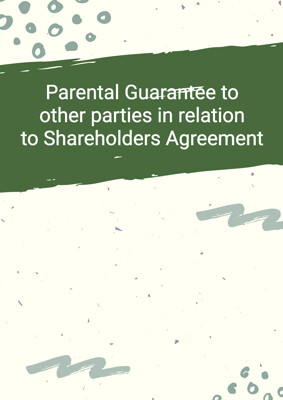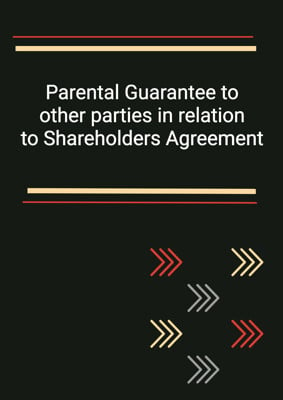How to Tailor the Document for Your Need?
01
Create Document
Fill in the details of the parties. You can click the "Fill with Member’s Information" button to complete it with information saved to your account.
02
Fill Information
Please fill in any additional information by following the step-by-step guide on the left hand side of the preview document and click the "Next" button.
03
Get Document
When you are done, click the "Get Document" button and you can download the document in Word or PDF format.
04
Review Document
Please get all parties to review the document carefully and make any final modifications to ensure that the details are correct before signing the document.
Document Preview
Document Description
The Shareholders Agreement is a legally binding document that outlines the terms and conditions governing the relationship between the shareholders of a company. It is entered into by party 1, party 2, party 3, party 4, and party 5, who have agreed to jointly invest in a company. The purpose of this agreement is to set out the terms governing their relationship as shareholders in the company. The agreement consists of several sections, each addressing different aspects of the shareholders' rights and obligations.
Section 1: Interpretation
This section provides definitions for various terms used throughout the agreement, such as accounting principles, directors, business day, and shareholders.
Section 2: Purpose of the Company
This section describes the business of the company and states that it should be conducted in the best interests of the company in accordance with the approved business plan.
Section 3: Characteristics of the Company
This section outlines the characteristics of the company, including its name, registered office, and initial directors and officers.
Section 4: Capital and Further Finance
This section covers the issuance of new shares, funding support by the parties, and the procedure for obtaining further finance if needed.
Section 5: Board and Management
This section defines the responsibilities of the board of directors and the composition of the board. It also specifies the quorum for board meetings and the notice and agenda requirements.
Section 6: Reserved Matters
This section lists the matters that require the approval of all parties before any action or decision can be taken. These matters include altering the memorandum and articles, changing the share capital, and entering into material contracts.
Section 7: Financial Matters
This section addresses accounting principles, auditors, financial year, and dividend policy.
Section 8: Information and Reporting
This section outlines the rights of each party to access information and receive reports regarding the company's financial performance and operations.
Section 9: Confidentiality
This section imposes an obligation on each party to keep confidential any information related to the company's business, customers, or affairs.
Section 10: Non-Competition
This section prohibits each party and its subsidiaries from competing with the company in the business.
Section 11: Regulatory Matters
This section requires the parties to cooperate in providing information and taking necessary actions to comply with regulatory requirements.
Section 12: Relationship with Party's Group
This section sets out the obligations of each party to ensure that contracts with its group companies are made on an arm's length basis and that the best interests of the company are promoted.
Section 13: Tax Matters
This section requires each party to cooperate in connection with tax returns, claims, or elections relating to the company group's taxation affairs.
Section 14: Transfer of Shares
This section governs the transfer of shares and specifies the conditions and procedures for transfers between the parties and to third-party purchasers.
Section 15: Termination Events
This section identifies events that would trigger the termination of this agreement and the procedures for making an offer to purchase the shares of the affected party.
Section 16: Default
This section allows the non-defaulting party to serve notice upon the defaulting party in the event of a breach of this agreement and seek remedies or damages.
Section 17: Transfer Terms
This section outlines the terms and conditions for the transfer of shares, including the sale price, assumption of obligations, and completion procedures.
Section 18: Parent Company Further Assurances
This section requires each party to exercise its rights and powers to ensure the fulfillment of this agreement and the performance of obligations by its group companies.
Section 19: Non-Assignment
This section prohibits the parties from assigning or transferring their rights and obligations under this agreement without prior written consent.
Section 20: Waiver of Rights
This section states that the waiver of any provision of this agreement does not constitute a waiver of any other provision or subsequent breach.
Section 21: Amendments
This section specifies that any variation of this agreement must be in writing and signed by all parties.
Section 22: Invalidity
This section states that if any provision of this agreement is invalid or unenforceable, it has no effect and does not invalidate the remaining provisions.
Section 23: No Partnership or Agency
This section clarifies that this agreement does not create a partnership or agency relationship between the parties.
Section 24: Announcements
This section requires the parties to obtain prior written approval before making any formal public announcements or press releases regarding this agreement.
Section 25: Costs
This section states that each party is responsible for its own costs incurred in connection with this agreement.
Section 26: Entire Agreement
This section confirms that this agreement constitutes the entire agreement between the parties and supersedes any prior representations or understandings.
Section 27: Conflict with Articles
This section establishes that this agreement prevails over any conflicting provisions in the memorandum and articles of the company.
Section 28: Notices
This section specifies the requirements for giving notices or formal communications under this agreement, including the methods of delivery and addresses of the parties.
Section 29: Settlement of Disputes
This section encourages the parties to resolve any disputes amicably and provides for the referral of disputes to the respective chairmen/chief executives if necessary.
Section 30: Counterparts
This section allows this agreement to be executed in multiple counterparts, each of which is considered an original.
Section 31: No Rights for Third Parties
This section clarifies that this agreement does not confer any rights on third parties to enforce its terms.
How to use this document?
1. Familiarize yourself with the Shareholders Agreement and its importance in governing the relationship between shareholders in a company.
2. Understand the detailed introduction provided in each section of the agreement, which covers various aspects such as interpretation, purpose of the company, capital and further finance, board and management, reserved matters, financial matters, information and reporting, confidentiality, non-competition, regulatory matters, relationship with party's group, tax matters, transfer of shares, termination events, default, transfer terms, parent company further assurances, non-assignment, waiver of rights, amendments, invalidity, no partnership or agency, announcements, costs, entire agreement, conflict with articles, notices, settlement of disputes, counterparts, and rights for third parties.
3. Ensure compliance with the provisions of the agreement, including obtaining necessary approvals for reserved matters and adhering to confidentiality obligations.
4. Seek legal advice if any disputes or breaches of the agreement arise, and attempt to resolve them amicably before resorting to formal dispute resolution.
5. Keep all parties informed of any material developments regarding the company's business and financial performance.
6. Maintain accurate records and provide timely reports as required by the agreement.
7. Comply with tax obligations and cooperate with the other party in relation to any tax returns, claims, or elections.
8. Adhere to the restrictions on transferring shares, including obtaining consent from the other party or following the procedures outlined in the agreement.
9. Ensure that any transfers of shares are completed in accordance with the specified terms and conditions.
10. Exercise voting rights and powers to ensure the fulfillment of the agreement and the best interests of the company.
11. Keep confidential any information related to the company's business, customers, or affairs.
12. Avoid engaging in any activities that compete with the company's business.
13. Cooperate with the other party in providing information and taking necessary actions to comply with regulatory requirements.
14. Promote the best interests of the company and consult on matters materially affecting its development.
15. Comply with the provisions regarding notices and formal communications, including using the specified methods of delivery and addresses.
16. Seek legal advice if amendments to the agreement are required and ensure that any variations are made in writing and signed by all parties.
17. Keep records of all costs incurred in connection with this agreement.
18. Comply with the provisions regarding the settlement of disputes and the jurisdiction of the courts.
19. Ensure that all parties involved in the execution of this agreement receive a copy of the signed document.
Not the right document?
Don’t worry, we have thousands of documents for you to choose from:


























